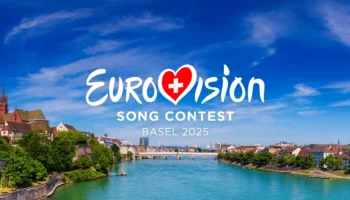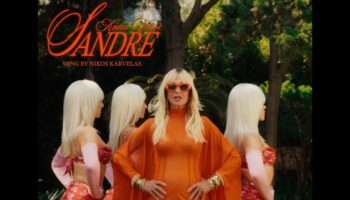Natasha St-Pier sang Je n’ai que mon âme in 2001 coming fourth.

Natasha St-Pier was born in Bathurst, New Brunswick, Canada in 1981 but France is the country where her career became established.
Her first album was called Emergence and was released in 1996 when she was only fifteen years old. In 1999, at the age of eighteen, she made her international singing debut as Fleur-de-Lys in the London version of the musical drama Notre Dame de Paris. Her second album came out in 2000, was titled À chacun son histoire or Everyone’s story and achieved enough sales to be certified gold.
Only one year later France Télévisions invited her to take part in the Eurovision Song Contest. Unusually a portion of the song was performed in English. Afterwards she released a totally English version entitled All I have is my soul.
Since then she has had success at the top of both the French album and singles charts and become popular in other European countries. She has duetted with Lady Gaga, played the role of Elvira in Don Juan and been a coach in the 2nd and 3rd seasons of The Voice Belgique.

The Eurovision Song Contest 2001 was the forty sixth edition of the event.
The venue this year was to be the biggest in the history of the contest. The Parken Stadium, in the Indre Østerbro district of Copenhagen is the home ground for FC Copenhagen and the Danish national football team. The capacity can be as much as 50,000. For the first few days of the rehearsals the press sat in coats and jackets in this mammoth space. To enable the hosting in this stadium the company managing it installed a retractable roof.
Thirty eight thousand people attended but had some difficulty in seeing and hearing the acts. Sitting at one end of the arena the stage was hard to see without using the screens.
The process of qualifying for the contest had changed. The Big Four had been established and the fifteen countries in the placings of the previous year followed. Finally those who had been excluded in 2000 were invited back.
Notable happenings: The United Kingdom commentator offended the Danish people with his remarks on the presenters and the BBC made an apology. The Swedish song Listen to your heartbeat was compared with the Belgian entry from 1996 Liefde is een kaartpel. The song was allowed to participate but a legal proceedings were discussed. The interval act from Aqua used some words which the BBC deemed to be unsuitable and the sound that they broadcast during their performance did not include those particular ones.
For the first time the voting now included the option of a 50/50 split between televoting and a jury.
The top four songs took the lion’s share of the votes. France, with Natasha St-Pier and Je n’ai que mon âme placed fourth with 142 points. Then Greece with Antique singing Die for you came third with 147 points.
The top two were the home country, Denmark, whose Rollo & King sang Never ever let you go and Estonia’s Tanel Padar, Dave Benton, & 2XL singing Everybody. The Danes scored 177 points and the Estonians won the day with 198 points.
[tps_footer]
You can read our previous Countdown to Eurovision’s Greatest Hits articles below:
Stay tuned to esctoday.com for Part 4 of our countdown to Eurovision’s Greatest Hits
[/tps_footer]




